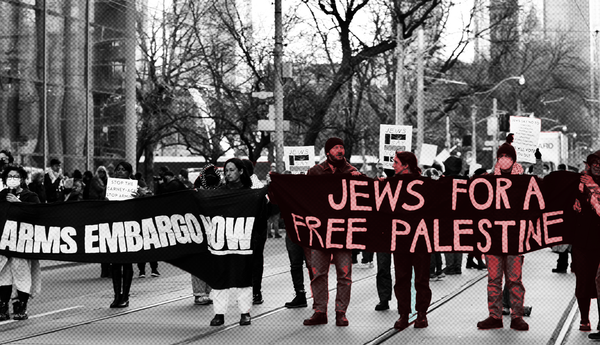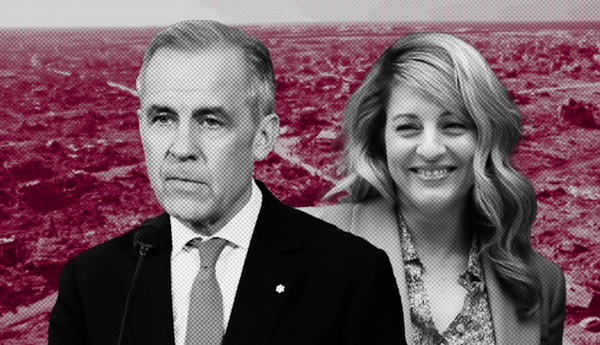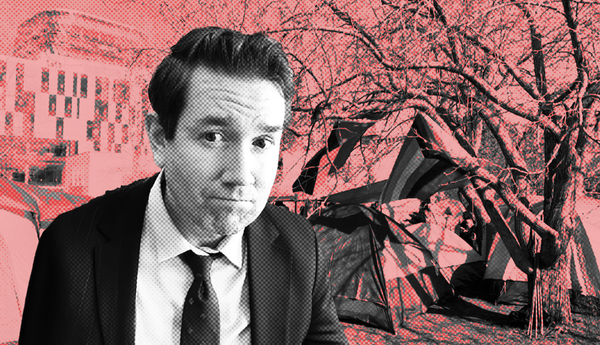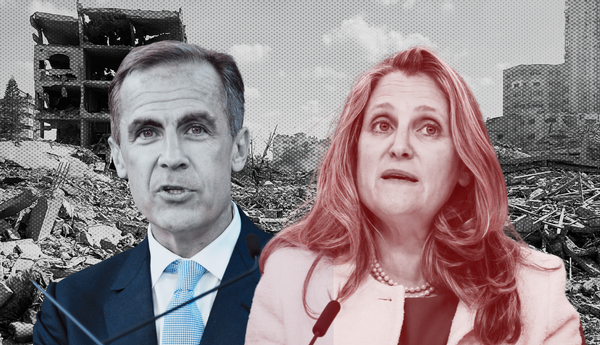Sarah Zagoda, the NDP candidate in the Alberta riding of Banff-Airdrie for the 2021 election, had multiple encounters with members of the far-right People’s Party of Canada during the campaign period.
At a Sept. 13 all-candidates’ debate in Canmore — which was held at a local seniors’ centre — local PPC candidate Nadine Wellwood and an entourage of supporters gathered outside the venue, Zagoda recalled.
“She just wanted to come in and make a two minute statement without a mask, and then leave,” Zagoda told The Maple. Wellwood had a medical letter exempting her from wearing a mask, which, said Zagoda, the organizers initially refused, but ultimately accepted. But Wellwood still refused to participate in the forum.
Also in attendance at the event was independent candidate Derek Sloan, a former Conservative leadership candidate and MP expelled from the Tory caucus earlier this year after he accepted a donation from a prominent neo-Nazi for his failed leadership campaign.
According to Zagoda, Sloan also wanted to make a short statement without a mask, then leave, a request rebuffed by the forum’s organizers.
“This whole thing took away from the event,” said Zagoda. “It postponed everything.”
Some attendees ended up leaving half-way through the forum because it was getting late, with the event having been delayed, Zagoda added.
One of the organizers of the candidates’ forum — who asked not to be named for fear of re-inflaming a situation that resulted in a barrage of angry comments on social media — confirmed to The Maple that Wellwood, Sloan and another independent candidate, Ron Voss, refused to participate in the event unless they could do so without a mask. Wellwood would only participate with her exemption if the other two candidates were also allowed to participate without masks, the organizer said.
In a phone call with The Maple, Wellwood said she was the first candidate to arrive at the event, and that Sloan and Voss stood outside to support her before her exemption letter was accepted. Wellwood said that despite the organizers eventually accepting the letter, she refused to participate unless Sloan and Voss were also allowed to participate.
“They stood with me in order to push to have my medical exemption respected and honored,” said Wellwood. “It had nothing to do with them not wanting to wear a mask — they were quite happy to wear masks — and everything to do with the fact that they stood outside with me.”
Zagoda said she believes the PPC came prepared for the drama that unfolded. “They came with a camera guy, they came with mics, they came with an entourage just to start drama, which took away from the whole event,” she said.
When the forum proceeded, Zagoda explained, individuals who appeared to be Wellwood’s supporters stood up, yelled and called the non-PPC candidates “sheep.”
When the forum was over, at around 9:30 p.m., Zagoda said she returned to her car to find it covered in Sloan’s campaign propaganda.
The next day, Sept. 14, an all-candidates’ forum took place in Cochrane where Zagoda said a number of protesters lined the streets and shouted. All the candidates participated in the Cochrane event except for Voss — Sloan wore a mask.
At the end of the event, Zagoda continued, Wellwood was upset because she wasn't asked about vaccine passports, and left the building. One of her supporters attempted to commandeer the mic, but it was shut off.
After a Sept. 8 event at Airdrie Public Library, Zagoda explained, she and candidates for the Liberals and Greens agreed to sit together at future events for safety. Liberal candidate David Gamble was harassed by PPC supporters at the library event, and had to be escorted to his car, Zagoda said.
The PPC ultimately finished fourth place in the riding, securing 7.6 per cent of the vote.
Zagoda said the voters she encountered while campaigning who expressed support for the PPC were mostly fixated on a single issue: COVID-19 and vaccine passports.
“None of them had read the (PPC) platform,” said Zagoda of the PPC voters she encountered. “Not a single one.”
“Next election, what are they going to have?,” she added. “What will they have to rally up people?”
Where Did The PPC’s Growth Come From?
Despite not winning any seats on election night, the far-right People’s Party tripled its popular vote share to five per cent, and managed to finish second place in several Conservative-stronghold ridings in rural Alberta.
Evan Balgord, executive director of the Canadian Anti-Hate Network, told The Maple that in the 2019 federal election, many people sympathetic to the PPC’s far-right messaging decided to vote strategically for the Conservatives.
“This time around the COVID conspiracy movement and the far-right are not happy with Erin O'Toole,” said Balgord. “So this time around, many more of them decided they weren't going to vote strategically, and they were going to vote for the PPC; that's where they got their bump from.”
The PPC was launched in September 2018 by former Conservative cabinet minister and failed Tory leadership contestant Maxime Bernier. However, Balgord said the PPC's broader membership has its roots in a larger trajectory of far-right movements in Canada, with the current iteration of those movements beginning around 2016.
“(The current Canadian far-right movement) started as an anti-Muslim movement; the first thing they took to the streets to demonstrate against was Motion 103, which was that non-binding motion to condemn Islamophobia,” said Balgord.
When that parliamentary motion passed, he explained, the far-right turned its attention to broader grievances about the federal government, but needed a new issue to organize around.
Around 2018 and 2019, the movement looked to France at the “yellow vest” movement, which had protested a broad range of issues, including fuel taxes. The far-right in Canada, Balgord said, “ripped off” the yellow vest brand.
“Very importantly, these are the same anti-Muslim hate groups that we were monitoring,” said Balgord. “They just started calling themselves ‘Yellow Vests Canada.’”
Nonetheless, said Balgord, that movement claimed it was not racist, and presented itself as being focused on oil and gas, Western alienation and anger at Ottawa.
Much of the media — and some ordinary Canadians — Balgord explained, bought that narrative. Some mainstream conservatives who joined the movement quickly discovered it contained anti-Muslim racism, complained and were kicked out.
“The people that hung around were just fed racist propaganda, and a lot of them became racists,” Balgord said, adding that anti-trans and anti-feminist messaging also prevailed within the movement.
When the yellow vest movement faded, many of the individuals who were involved found a permanent home as part of Canada’s broader far-right. But once again, Balgord explained, the movement needed a new issue to rally around.
Pandemic Fuelled PPC’s Growth
Then came the pandemic.
“COVID was like manna from heaven for them,” said Balgord. “All these people on the far right, they're conspiratorial to begin with. They believe in conspiracies about (U.S. Democratic Party financier) George Soros; they believe in conspiracies about white replacement.”
Canada’s far-right quickly became COVID-19 conspiracy theorists, Balgord explained. As some of the earliest adopters of those conspiracies, the far-right were then able to bring many ordinary Canadians into their spaces, and indoctrinate people with racist beliefs.
While not everyone in the COVID-19 conspiracy movement is necessarily a racist, said Balgord, they stand shoulder to shoulder with avowed neo-Nazis and people calling for violent insurrections against the government, meaning some otherwise ordinary people are inevitably becoming radicalized.
“Because the conspiracy movement is so large, when we're done with COVID, we're going to have a much larger far right,” said Balgord.
It is against this backdrop of far-right politics that the PPC has grown.
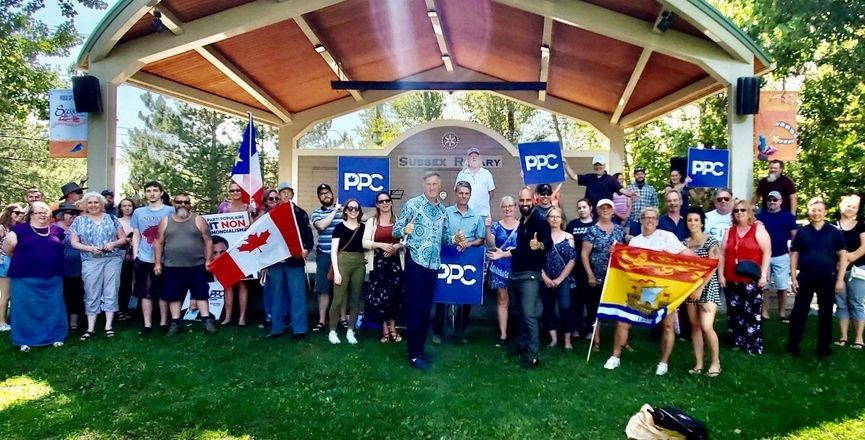
“When they started up in 2019, Maxine Bernier used the exact right language to dog whistle to the far-right (in) Canada,” said Balgord. “They literally said, ‘Bernier is dog whistling to us, should we vote for him?’”
“The PPC really is the party for white supremacists,” he added, noting that one of the party’s earliest riding association directors, Shaun Walker, had served jail time in the U.S. for leading a violent neo-Nazi group. (Walker is no longer involved with the PPC.)
More recently, during the election campaign, then-PPC riding association director and white nationalist Shane Marshall hurled gravel at Liberal Party Leader Justin Trudeau at a campaign event in London, Ont. On election night, the party’s candidate for Elgin-Middlesex-London, Chelsea Hillier, joined a white nationalist’s live stream.
When the pandemic subsides, Balgord does not foresee the COVID-19 conspiracy movement quietly disappearing.
“I think that the COVID conspiracy movement is going to outlast the pandemic,” he said, “and I don't know by how long, but they're going to continue to rally around this thing for a while … then there'll be the next issue that they all rally around.”
Barbara Perry, director of the Centre on Hate, Bias and Extremism at Ontario Tech University, agrees the PPC has capitalized on negative responses to public health measures during the pandemic.
“They have become the party of the discontent, if you will, in that context,” Perry told The Maple. “So I think they’ve actually broadened their appeal, broadened their audience to include the mainstream.”
“I think that even in terms of the post-COVID recovery, they will find a way, I suspect, to manipulate that in a way that retains a lot of those same people, and perhaps even new ones from the elements of society that feels like maybe they've been left behind in terms of economic supports,” she added.
Despite the party’s association with known white nationalists, many leading PPC members strongly reject the notion that the party is itself white nationalist. However, Perry said the party’s 2021 election platform’s focus on issues such as “Canadian identity,” “immigration” and “refugees” echoes far-right talking points.
“There's still that virulent anti-immigrant and anti-refugee narrative, and in particular, immigrants and refugees who are identified as Muslim,” said Perry. “The language they use — the ‘cult of diversity,’ the ‘flow’ of refugees, that sort of language — that's classic far-right language, white nationalist language.”
Those elements of the party’s messaging are likely to persist after the pandemic subsides as a leading issue, she explained.
“I think there's that potential to bring even these newcomers around COVID into the fold with respect to these other ideological foundations as well,” said Perry.
Bernier’s having been a Conservative cabinet minister under Stephen Harper lends a veneer of credibility to an otherwise fringe political movement, Perry added.
“I think that biography that (Bernier) brings does lend some credibility, dare I say, in some respects, even more than (former U.S. president Donald) Trump,” said Perry. “At least (Bernier) can lay claim to some kind of political experience, and he comes from a political family.”
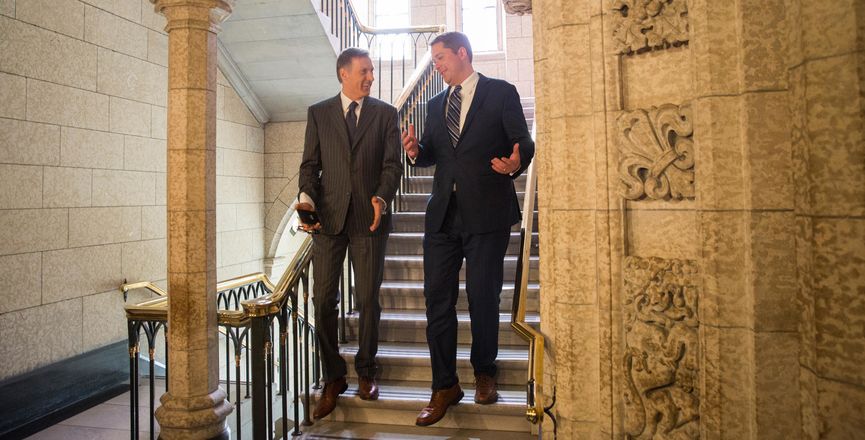
Bernier’s father, Gilles Bernier, served as a Progressive Conservative MP for Beauce (the same riding Maxime used to represent), which Perry finds ironic, given the PPC’s tendency to lambast elite political families.
“To the extent that (the PPC are) also anti-authority, there's also this rejection of the elite, and (Maxime Bernier) is certainly amongst them, he is not ‘one of the people,’” said Perry.
And despite the PPC’s frequent complaints about biased media coverage, the party received sympathetic coverage from mainstream political commentators John Ibbitson and Andrew Coyne in The Globe and Mail during the election.
Perry described Ibbitson’s op-ed as particularly shocking. “It was an apology for the PPC,” she said.
The Maple reached out to the PPC seeking comment on its ideology and membership. In response, the PPC’s media spokesperson, Martin Masse, sent a screenshot of a tweet by Maxime Bernier calling journalists “despicable bullies.”
Last week, Bernier’s Twitter account was temporarily suspended after he published the email addresses of three journalists and encouraged his followers to harass them.
Is The PPC Dangerous?
How much of a physical threat are the PPC? The gravel-throwing incident in London prompted widespread condemnation across party lines, and after the incident, Bernier himself tweeted: “Words are our weapons. But physical violence is ALWAYS wrong.”
Dan Foster, the Liberal Party’s campaign manager for the riding of Elgin-Middlesex-London, said his team did not experience any aggression from PPC members during the election.
“I was in on the first (debate) session with all the candidates, and (PPC candidate) Chelsea (Hillier) was very gracious,” Foster told The Maple. “The only thing that we noticed is a lot of our signs disappeared, but we don't really know (who was responsible).”
Foster said he was present at the campaign event where the gravel-throwing incident took place. “I don't like to see that, but I mean ... I think Trudeau said himself that he wasn't bothered by it; he felt something on the back of his head.”
Foster said he believes the incident “was blown way out of proportion to what actually happened.”

In Balgord’s view, however, three key ingredients breed the risk of extremist violence: belief that something terrible is happening (in this case, the false belief that vaccines are killing people), having proximate targets (politicians and provincial health ministers) and hopelessness.
“All it takes when you have that kind of a dangerous situation with those three elements is an unstable person to take it upon themselves to act out that shared violent fantasy of the group,” said Balgord.
“Somebody could come out of the COVID conspiracy, far-right PPC ecosystem and do something dramatic or very dangerous, because all the pre-requisite elements are there, but I don't think it would be particularly organized,” he added.
Where Does The Far-Right Go From Here?
Desiree Bissonnette was the NDP’s 2021 candidate for the Alberta riding of Lakeland, where the PPC’s candidate, Ann McCormack, finished second with 11 per cent of the vote.
Bissonnette said that her community was not as polarized during the campaign as she had expected, and that she had only two “significant” run-ins with PPC campaigners.
At a local all-candidates’ debate for the neighbouring Battlefords—Lloydmister riding, Bissonnette said the local PPC candidate arrived with a volunteer wearing a t-shirt promoting InfoWars, a far-right conspiracy website. The volunteer also refused to wear a mask and attempted to make an announcement on the debate stage before being escorted away by security, said Bisonnette.
In a second encounter, Bissonnette said she met a PPC volunteer while she was out doorknocking.
“(The PPC volunteer) was really nice; like, you can tell that the PPC has a lot of people that have moved to their side who don't believe in a lot of the same things that they do,” Bissonnette explained. “But you know how far-right populism, and just populist politics in general, can really grab ahold of people emotionally on one item specifically.”
Bissonnette, who identifies as a socialist on the NDP’s left wing, found that the PPC voters she encountered were mostly people who were either non-voters or former Conservatives angry at what they perceived to be Erin O’Toole’s “moderate” party leadership. Notably, she added, there was little talk about Alberta’s unpopular United Conservative Party government.
Bissonnette said she thinks the PPC’s rise highlights failures on the left.
“I think that the PPC kind of shows the left how crappy we are at our jobs,” she said. “(The PPC) are actually putting in the work that I think that the left should be putting in, but we spend a lot of our time infighting and trying to play politics in a similar way that small-c conservative parties and neoliberal parties tend to, like we're trying to fit into that.”
Even though she was running in a riding that the NDP had little prospect of flipping from the Conservatives, Bissonnette said she did not feel adequately supported by her party’s central campaign.
“I didn't get my signs until the last day, before the last week of election time; I requested leaflets in August, and I actually didn't receive anything from the NDP,” she said, adding that her campaign was forced to borrow election materials from candidates in other ridings.
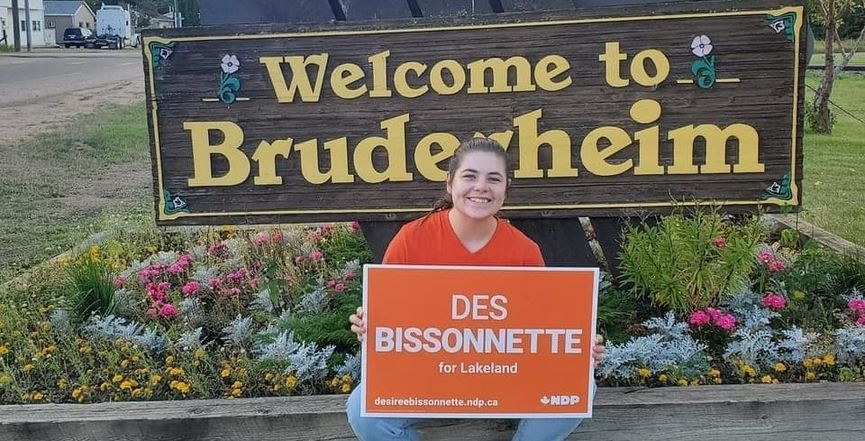
By contrast, Bissonnette explained, PPC candidates appeared to be receiving significant support from their central campaign. Still, despite receiving lacklustre support from her party, Bissonnette increased the NDP’s vote share in Lakeland to 10 per cent — up from the six per cent the party received in that riding in 2019.
“It tells me that there is people who will rise and come to meet for the more progressive side; we just need to put in the real action work,” she said.
For her part, despite troubling encounters with the party during the election campaign, Zagoda said she is not intimidated by the PPC and will not be dissuaded from being involved in future political campaigns.
“Their party is set on dividing Canada, and they’re hypocrites,” said Zagoda.
Bissonnette predicts the PPC will continue to grow unless the left starts taking the far-right party more seriously, listening to grassroots activists and providing resources in regions where the PPC is ascendent.
“I long for the day that politics is about hope, instead about being afraid for the other guy to win,” she added. “It's about the hope for a better future.”
Editor's note, Sept. 28, 2021: This story has been updated to clarify the timeline of events in Sarah Zagoda's account of what happened during the election campaign in Banff-Airdrie.
Alex Cosh is the managing editor of The Maple.



